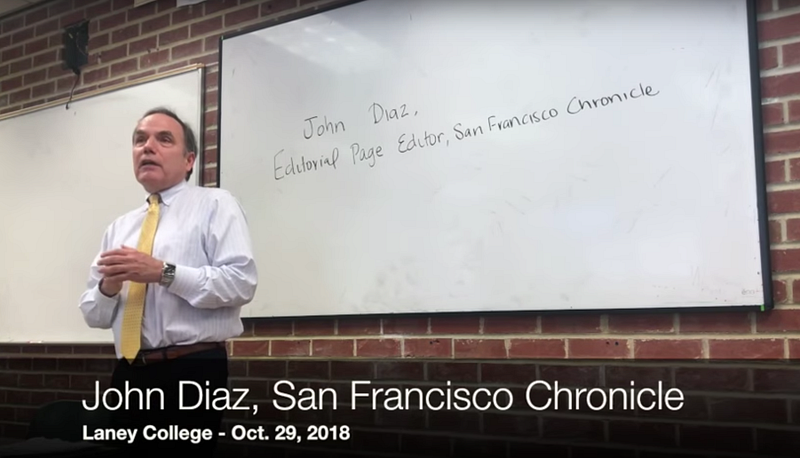by Geremy D. Lowe, Staff Writer

New journalists have an advantage in career searching because society is becoming integrated with technology, said John Diaz, editorial page editor of the San Francisco Chronicle, when he spoke to the Survey of Mass Media class taught by Eleni Gastis on Oct. 15 in F204.
The topics of the future of the journalism industry and the political climate facing society today sparked discussion among the students, instructors and Diaz during the talk.
“Studying journalism can be a plus now,” he said. “Being able to understand how the tools work to make things go viral,” and the ability to do photography, headlines and writing, is also good experience, he said.
Diaz mentioned the lack of diversity in newsrooms, and wanted to address what can be done to increase the employment pool.
“When I hire, I am looking for the best possible people,” he said. “It’s a matter of going out and finding the widest and the best pool of applicants, and diversity works.” He confirmed that the world goes beyond the social norms which have been in place for centuries and has been changing.
Diaz worked for the Associated Press in Philadelphia. He mentioned the effectiveness that wire services have in reporting news — from accessing radio to the ability to tweet on the spot, which allows journalist to stay up-to-date.
“Since you’ve worked in different places, you mention there was a downside,” one journalism student said. “What does it mean for you to work in community?”
Diaz responded that feedback is an essential part of journalism because being a journalist is not only a profession, it’s considered public service.
“I like that level of accountability,” he said. “It keeps you in check.”
After his tenure at the AP, Diaz became a reporter for the Denver Post. He later moved back to the Bay Area to work for the Chronicle in 1990, where he was the assistant city editor for six years. Diaz became the editor of the editorial page 1996 and has been in that position ever since.
“Don’t go in and feel like you need to know everything day one,” Diaz said. “Listen to the people who work for you, and that goes a long way with people trusting you.”
Journalism instructor Scott Strain was curious as to why the Chronicle didn’t partner with the Boston Globe and 325 national newspapers on their organized response to Trump ridiculing the press by calling them “the enemy of the people.”
Prospective journalists play a huge part in determining the future of news, Diaz responded, stating the importance of students and society understanding the First Amendment.
“If everyone does the same thing, it’s not an original thought — it’s a petition,” he said. “I think we need to be independent.”
The recent controversy on Kanye West’s visit to Donald Trump in the White House gained momentum among the students in light of this. Many students wondered why the meeting was allowed to be televised.
Another student expressed his thought on how West is the voice of this generation.
“Kanye has the biggest platform in music history,” he said, and added that West has gained popularity among young voters because of his platform, and that his opinions have always been less than subtle.
Diaz encouraged the student to look into a future in editorial writing because of his expressive views and political knowledge.
“This is the longest time Donald Trump has shut up,” Diaz said. “Kanye had some really important issues he wanted to bring up, but it was this scattered-shot stream of consciousness” that resulted.
In the coming weeks, interested students can attend one of the talks around journalism featured on Mondays from 1:30–3:30 p.m. in room F-204. Chris De Benedetti will share his knowledge of sports journalism on Oct. 29. All students or interested employees are invited to attend and give their input at the events.

























